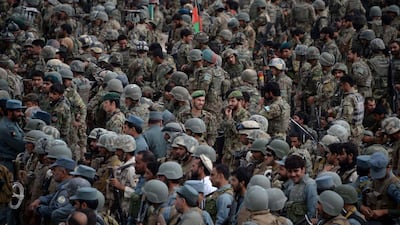KABUL // Weeks after confirming the death of their spiritual leader Mullah Mohammed Omar, the Taliban have intensified their military efforts in Afghanistan, targeting territory once considered integral to the struggle for control of the country.
Large areas across the north and south have fallen into the hands of the insurgents throughout the summer, while several deadly attacks have hit the capital, Kabul.
Although the government has since retaken some places, the unrest has only underlined the Taliban’s determination to step up their campaign following the withdrawal of most foreign troops last year.
Afghans officials predicted that infighting would severely undermine the Taliban as it struggled to deal with members who opposed Mullah Omar’s successor. Any divisions that exist, however, have done little to stop the movement’s momentum on the ground.
Last week, the Taliban launched a coordinated assault on the Musa Qala district in Helmand province, capturing an area which has held symbolic importance to both the Afghan government and Nato. Aided by US air strikes, Afghan forces subsequently retook the district centre.
The success of the initial assault nevertheless represented a propaganda victory for the Taliban, with images on social media showing some of them wearing military uniforms, and others in civilian clothes, standing around armoured Humvees.
The loss of more territory – albeit temporarily – only fuelled sentiments among civilians and analysts that the war was never going to be decided by the fate of Mullah Omar.
Even as the government regains control of some areas, there are signs that the conflict is escalating and the insurgents are calling the shots.
“The news of Mullah Omar’s death didn’t have any bad effect on the military side of the Taliban,” said Nazar Mohammed Mutmaeen, a former Taliban official. “The Taliban are not fighting for Mullah Omar, they are fighting ideologically against the enemy.”
Helmand has long been one of the most volatile parts of Afghanistan. Faced with fierce resistance in 2006, British forces withdrew from Musa Qala after striking a deal with local elders.
The Taliban then took control of the area for most of 2007 before a Nato operation recaptured the district that December.
Events over the past week have again demonstrated how the fight for territory has intensified this summer.
Although no cities have fallen, government officials appear at a loss over what to do, arguing among themselves and issuing contradictory statements about the best way forward.
Having tried to improve relations with Pakistan, Afghan president Ashraf Ghani has shown signs of losing patience with that approach.
Meanwhile, his first vice president, the warlord Abdul Rashid Dostum, has mobilised militiamen in the north, stoking fears that the turmoil of the 1990s is returning.
The government had hoped Mullah Omar’s death would strengthen its hand on the battlefield and at the negotiating table, having announced last month that he “died suspiciously” in a Pakistan hospital in April 2013.
The Taliban confirmed his death but not the details and announced Mullah Akhtar Mansour, a co-founder of the movement, as the new leader. His appointment angered some members and caused divisions to open up.
The head of the Taliban's political office in Qatar resigned and other senior figures were rumoured to be rallying around Mullah Omar's son, Yaqoob, as an alternative choice to lead the movement. Rival Taliban factions have clashed in the southern province of Zabul, the Associated Press reported recently.
Mr Mutmaeen said Mullah Mansour wanted peace and would be prepared to negotiate in future, but needed to smooth over any remaining discord by stepping up the fight against the government.
He received a boost to his credentials when the Al Qaeda leader, Ayman Al Zawahiri, pledged allegiance to him, saying he was doing so to renew “the path of Sheikh Osama and the devoted martyrs”.
Zabiullah Mujahid, a Taliban spokesman, told The National the selection of Mullah Mansour had been carried out in accordance with Islamic teaching.
“Mullah sahib himself wasn’t happy to be emir, but he was chosen as emir because of his good personality,” he said.
Mr Mujahid insisted any differences with Mullah Omar’s family and political representatives in Qatar were close to being resolved. He acknowledged that scholars had failed to persuade some other members to support Mullah Mansour, but said this internal opposition was not very serious.
“Thank God, the way of jihad is going even better than before,” he said.
The upsurge in violence could lead to record number of civilian casualties for the year, according to the UN. In the first half of 2015, the number of civilians killed or injured in fighting and attacks was 4,921 – up one per cent compared to the same period last year. The UN blamed the majority of casualties on “anti-government elements”.
Although the Taliban remain the dominant insurgent group, ISIL has gained a foothold in Afghanistan and attracted some Taliban defectors, most notably in Nangarhar province. Mr Mujahid said these former members were criminals who had been kicked out of the movement.
With so much now at stake in the war there are widespread fears that the bloodshed will only increase. On August 7 a massive explosion in the Shah Shaheed neighbourhood of Kabul killed at least 15 people and wounded hundreds. No one claimed responsibility for the attack, which is believed to have been caused by a truck bomb.
The area now lies in ruins, with tributes to the dead hanging from crumbling buildings. Mohammedullah Ahmadi, 37, said his business selling vehicle spare parts and engine oil had been decimated by the blast.
He compared the Taliban and ISIL to the mujaheddin parties that fought the Soviets in the 1980s, and said some of the Taliban’s demands were “logical” and needed to be met to stop the bloodshed.
“All the new groups are like the past jihadi parties. They are not as serious as they claim but this will go on until we apply Sharia in the country,” he said.
foreign.desk@thenational.ae

